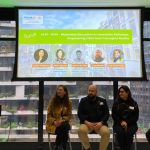On 5 June 2025, SUM joined forces with UNCHAIN, and ULTIMO in a one-hour webinar hosted by POLIS to spotlight how co-creation and stakeholder engagement are shaping sustainable urban mobility and logistics across Europe. The session brought together real-life examples from several European cities and provided a platform for cross-project dialogue on the challenges and opportunities of participatory innovation.
The webinar opened with three short introductions outlining each project’s approach. SUM project coordinator, Giulia Petrarulo, from INRIA, set the stage for SUM, explaining how it applies co-creation methods to the design of new shared mobility services, particularly within some of their Living Labs. Stakeholder involvement in SUM begins at the problem-identification stage and extends through solution development and implementation, ensuring alignment with local needs and promoting user adoption.
Zafeira Gkioulou presented ULTIMO, which is integrating Autonomous Vehicles (AVs) into urban transport systems through on-demand, electric, and fully automated services. Operating in three pilot cities, ULTIMO prioritizes inclusiveness and efficiency by engaging users and local authorities in service design and deployment.
The third introductory pitch came from Elisa Gomez, from POLIS, on behalf of the UNCHAIN, focusing on urban logistics and the development of tools such as Sustainable Urban Logistics Plans (SULPs) and Urban Vehicle Access Regulations (UVARs). UNCHAIN emphasizes multi-stakeholder collaboration to make urban freight systems cleaner and more efficient, and to overcome the data and governance gaps that hinder coordinated action.
Cases in European Cities
Moderated by Elena Garcia Jimenez, the core of the webinar featured four city-level case presentations, each highlighting a different facet of co-creation in action.
First, Esmee Hof (City of Mechelen) introduced the Flemish city’s role as a Follower City in UNCHAIN. Mechelen has a long-standing commitment to sustainable transport, starting with its UVAR plan in 2011. Through UNCHAIN, the city is engaging with tools for freight-efficient land use, urban logistics governance, and shared facility management. Co-creation activities in Mechelen aim to adapt and demonstrate these tools in ways that respond to local economic and spatial realities.
Next, Myriam Bris presented the case of Geneva, which operates at the intersection of SUM and ULTIMO. Geneva is currently preparing to deploy fifteen automated vehicles capable of covering 99% of the local public road network as part of ULTIMO. These vehicles will connect suburban and peri-urban areas to existing public transport lines via over 600 shared bus stops. Stakeholder engagement has been central to Geneva’s approach, involving local authorities, mobility providers, and citizens in discussions on service design, integration with existing networks, and digital booking tools.
The third city to present was Madrid, with Maria Eugenia Donaire, from Madrid City Council showcasing the city’s urban logistics innovations under UNCHAIN. Madrid is developing an ecosystem of data-driven tools for dynamic curbside management, delivery point planning, and congestion forecasting. Co-creation is embedded through collaboration between the municipality, public transport operator EMT, DHL, and several tech and research partners. Together, they are working to optimize space use and service delivery in a high-demand, high-density environment.
Finally, Tom Mauno, from Fredrikstad Municipality, described the SUM project’s work in the Norwegian city, where shared mobility is being tested in connection with ferry-based transport. In a three-hour co-creation workshop involving 34 local participants, residents and professionals jointly developed service concepts for improving the user experience of ferry-enabled mobility. Suggestions ranged from mimicking autonomous ferry services to enhancing ferry stop environments and adding parcel pick-up infrastructure. These ideas are now being assessed for implementation potential, with the goal of piloting user-informed improvements.
The webinar closed with a brief Q&A session, reaffirming a central message: co-creation is a pathway to relevance, acceptance, and impact. Whether dealing with passenger mobility or urban freight, these projects demonstrate that inclusive, participatory planning is essential to building sustainable urban transport systems that work for all.
Stay engaged and follow SUM as we continue to showcase how shared mobility is driving innovation in European cities. A new series of webinars is just around the corner, so keep an eye on our channels—and don’t miss the chance to learn from our experts as they share the latest developments from our Living Labs in their expert sessions.
You couldn’t attend it? Take a look now!




